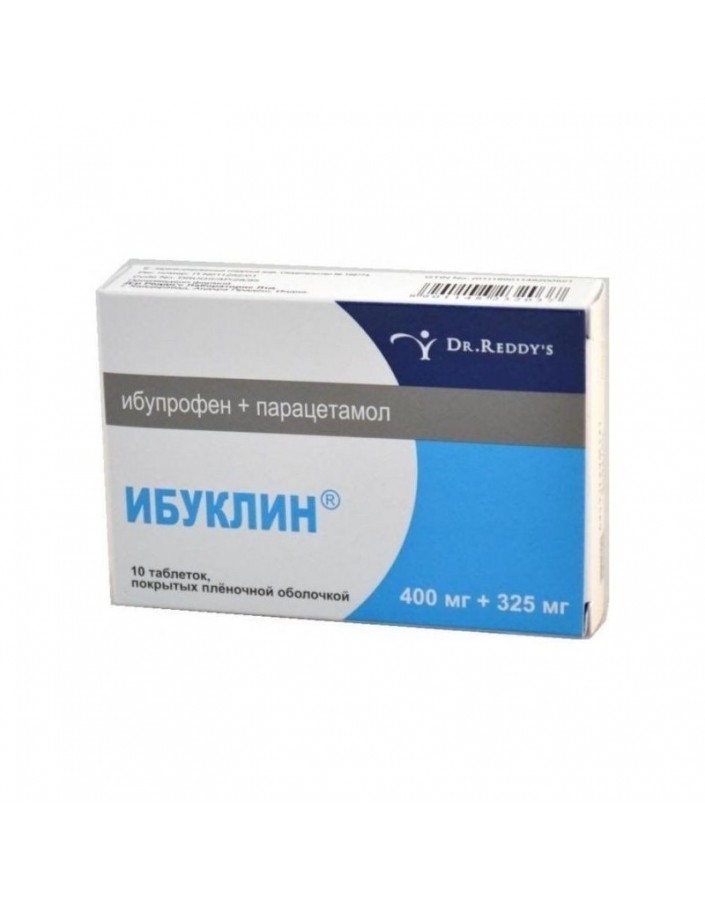




Security policy (edit with Customer reassurance module)

Delivery policy (edit with Customer reassurance module)

Return policy (edit with Customer reassurance module)
1 pill contains Ibuprofen 400 mg, Paracetamol 325 mg
10 pieces.
Anti-inflammatory, analgesic, antipyretic. Ibuclin weakens the excitability of the center of thermoregulation in the hypothalamus (paracetamol); inhibits the synthesis of PG (ibuprofen, paracetamol); stimulates the formation of endogenous Interferon (ibuprofen).
Weak and moderate pain syndrome of different origin (headache, toothache, neuralgia, pain in osteochondrosis of the spine, arthralgia, myalgia, tendovaginitis, bursitis, pain in case of traumatic damage to muscles, ligaments, tendons); fever in infectious and inflammatory diseases (including diseases of the upper respiratory tract and upper respiratory tract - tonsillitis, pharyngitis, tracheobronchitis, sinusitis, otitis media); arthritis (rheumatoid arthritis, including juvenile ankylosing spondylitis, gouty arthritis, rheumatism), disalgomenorrhea, adnexitis.
Hypersensitivity, gastrointestinal ulcers, "aspirin" asthma, severe renal-hepatic failure, diseases of the optic nerve, deficiency of glucose-6-phosphate dehydrogenase, pregnancy, breast-feeding.
If necessary, the use of the drug Ibuclin during pregnancy and lactation (breastfeeding), should carefully weigh the expected benefits of therapy for the mother and the potential risk to the fetus or child. If necessary, use in the first trimester of pregnancy should be excluded long-term use of the drug Ibuclin.
If necessary, short-term use of the drug Ibuclin during lactation, the termination of breastfeeding, usually not required. In experimental studies, the embryotoxic, teratogenic and mutagenic effects of the components of the drug Ibuclin have not been established.
Ibuclin accept inside. Coated tablets: dosing regimen set individually depending on the evidence.
Adults and children over 12 years old: usually the initial dose - 1 tab. 3 times a day after meals.
The maximum single dose - 2 tab., The maximum daily - 6 tab.
When violations of the kidneys or liver break between doses - at least 8 hours.
From the nervous system and sensory organs: headache, dizziness, visual disturbances.
On the part of the gastrointestinal tract: nausea, anorexia, vomiting, gastralgia, erosive and ulcerative lesions of the gastrointestinal tract, bleeding, diarrhea.
Allergic reactions: rash, itching, urticaria.
Other: thrombocytopenia, impaired renal function and liver (with overdose).
The feasibility of using the drug as an antipyretic is solved in each case, depending on the severity, nature and tolerability of febrile syndrome.
To reduce the risk of adverse events from the gastrointestinal tract, use the minimum effective dose of the shortest possible course.
With the simultaneous use of indirect anticoagulants, it is necessary to monitor the indicators of the blood coagulation system.
It is necessary to avoid joint administration of the drug Ibuclin with other NSAIDs.
In order to avoid possible damaging effects on the liver during the period of taking the drug should not drink alcohol.
With prolonged (more than 5 days) intake of the drug, control of peripheral blood and the functional state of the liver is necessary.
The drug may distort the results of laboratory tests in the quantitative determination of glucose, uric acid in serum, 17-ketosteroids (the drug must be removed 48 hours before the study).
With simultaneous use of the drug Ibuclin® with drugs may develop various effects of the interaction.
Prolonged combined use with paracetamol increases the risk of nephrotoxic effects.
The combination with ethanol, glucocorticosteroids, corticotropin increases the risk of erosive and ulcerative lesions of the gastrointestinal tract.
Ibuprofen enhances the effect of direct (heparin) and indirect (coumarin and indandion derivatives) anticoagulants, thrombolytic agents (alteplase, anistreplaza, streptokinase, urokinase), antiplatelet agents, colchicine - the risk of hemorrhagic complications increases.
Enhances the hypoglycemic effect of insulin and oral hypoglycemic drugs.
Weakens the effects of antihypertensive drugs and diuretics (by inhibiting the synthesis of renal prostaglandins).
Increases blood concentration of Digoxin, lithium preparations and Methotrexate.
Caffeine enhances the analgesic effect of ibuprofen.
Cyclosporine and gold medications increase nephrotoxicity.
Cefamundol, cefoperazone, cefotetan, valproic acid, plykamycin increase the incidence of hypoprothrombinemia.
Antacids and colestyramine reduce the absorption of the drug.
Myelotoxic drugs contribute to the hematotoxicity of the drug.
Symptoms: gastrointestinal disorders (diarrhea, nausea, vomiting, anorexia, pain in the epigastric region), an increase in prothrombin time, bleeding in 12-48 hours, lethargy, drowsiness, depression, headache, tinnitus, impaired consciousness, heart rhythm disturbances, decrease in arterial pressure, manifestations of hepato-and nephrotoxicity, convulsions, hepatonecrosis may develop.
Treatment: gastric lavage during the first 4 hours; alkaline drink, forced diuresis; activated charcoal orally, the introduction of SH-group donators and precursors of glutathione-methionine synthesis 8–9 hours after an overdose, and N-acetylcysteine orally or intravenously — after 12 hours, antacids; hemodialysis; symptomatic therapy. The need for additional therapeutic measures (further introduction of methionine, intravenous administration of N-acetylcysteine) is determined depending on the concentration of paracetamol in the blood, as well as on the time that has passed since taking it.
The drug should be stored in a dry, dark place at temperatures not above 20 ° C.